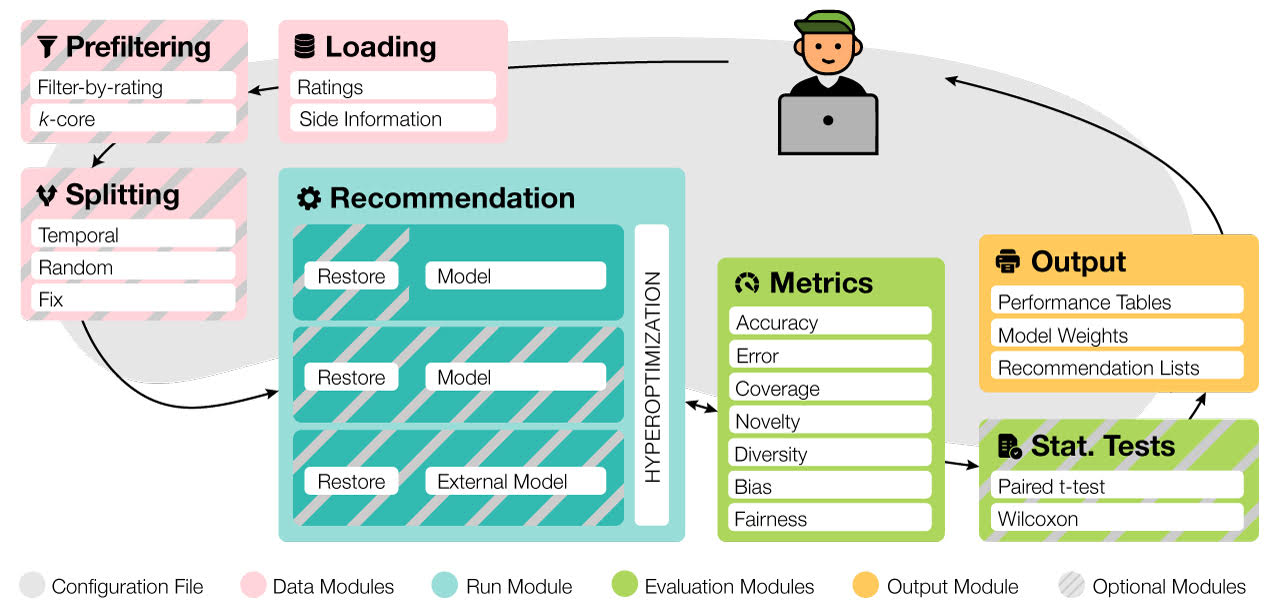sisinflab / Elliot
Programming Languages
Labels
Projects that are alternatives of or similar to Elliot
ELLIOT
Elliot is a comprehensive recommendation framework that analyzes the recommendation problem from the researcher's perspective. It conducts a whole experiment, from dataset loading to results gathering. The core idea is to feed the system with a simple and straightforward configuration file that drives the framework through the experimental setting choices. Elliot untangles the complexity of combining splitting strategies, hyperparameter model optimization, model training, and the generation of reports of the experimental results.
The framework loads, filters, and splits the data considering a vast set of strategies (splitting methods and filtering approaches, from temporal training-test splitting to nested K-folds Cross-Validation). Elliot optimizes hyperparameters for several recommendation algorithms, selects the best models, compares them with the baselines providing intra-model statistics, computes metrics spanning from accuracy to beyond-accuracy, bias, and fairness, and conducts statistical analysis (Wilcoxon and Paired t-test).
Elliot aims to keep the entire experiment reproducible and put the user in control of the framework.
Installation
Elliot works with the following operating systems:
- Linux
- Windows 10
- macOS X
Elliot requires Python version 3.6 or later.
Elliot requires tensorflow version 2.3.2 or later. If you want to use Elliot with GPU, please ensure that CUDA or cudatoolkit version is 7.6 or later. This requires NVIDIA driver version >= 10.1 (for Linux and Windows10).
Please refer to this document for further working configurations.
Install from source
CONDA
git clone https://github.com//sisinflab/elliot.git && cd elliot
conda create --name elliot_env python=3.8
conda activate elliot_env
pip install --upgrade pip
pip install -e . --verbose
VIRTUALENV
git clone https://github.com//sisinflab/elliot.git && cd elliot
virtualenv -p /usr/bin/python3.6 venv # your python location and version
source venv/bin/activate
pip install --upgrade pip
pip install -e . --verbose
Quick Start
Elliot's entry point is the function run_experiment, which accepts a configuration file that drives the whole experiment.
In the following, a sample configuration file is shown to demonstrate how a sample and explicit structure can generate a rigorous experiment.
from elliot.run import run_experiment
run_experiment("configuration/file/path")
The following file is a simple configuration for an experimental setup. It contains all the instructions to get the MovieLens-1M catalog from a specific path and perform a train test split in a random sample way with a ratio of 20%.
This experiment provides a hyperparameter optimization with a grid search strategy for an Item-KNN model. Indeed, it is seen that the possible values of neighbors are closed in squared brackets. It indicates that two different models equipped with two different neighbors' values will be trained and compared to select the best configuration. Moreover, this configuration obliges Elliot to save the recommendation lists with at most 10 items per user as suggest by top_k property.
In this basic experiment, only a simple metric is considered in the final evaluation study. The candidate metric is nDCG for a cutoff equal to top_k, unless otherwise noted.
experiment:
dataset: movielens_1m
data_config:
strategy: dataset
dataset_path: ../data/movielens_1m/dataset.tsv
splitting:
test_splitting:
strategy: random_subsampling
test_ratio: 0.2
models:
ItemKNN:
meta:
hyper_opt_alg: grid
save_recs: True
neighbors: [50, 100]
similarity: cosine
evaluation:
simple_metrics: [nDCG]
top_k: 10
If you want to explore a basic configuration, and an advanced configuration, please refer to:
You can find the full description of the two experiments in the paper.
Contributing
There are many ways to contribute to Elliot! You can contribute code, make improvements to the documentation, report or investigate bugs and issues
We welcome all contributions from bug fixes to new features and extensions.
Feel free to share with us your custom configuration files. We are creating a vault of reproducible experiments, and we would be glad of mentioning your contribution.
Reference Elliot in your blogs, papers, and articles.
Talk about Elliot on social media with the hashtag #elliotrs.
Cite
If you find Elliot useful for your research or development, please cite the following paper:
@article{DBLP:journals/corr/abs-2103-02590,
author = {Vito Walter Anelli and
Alejandro Bellog{\'{\i}}n and
Antonio Ferrara and
Daniele Malitesta and
Felice Antonio Merra and
Claudio Pomo and
Francesco M. Donini and
Tommaso Di Noia},
title = {Elliot: a Comprehensive and Rigorous Framework for Reproducible Recommender
Systems Evaluation},
journal = {CoRR},
volume = {abs/2103.02590},
year = {2021}
}
The Team
Elliot is developed by
- Vito Walter Anelli* ([email protected])
- Alejandro Bellogín ([email protected])
- Antonio Ferrara ([email protected])
- Daniele Malitesta ([email protected])
- Felice Antonio Merra ([email protected])
- Claudio Pomo* ([email protected])
- Francesco Maria Donini ([email protected])
- Tommaso Di Noia ([email protected])
It is maintained by SisInfLab Group and Information Retrieval Group.
* Corresponding authors
License
ELLIOT uses APACHE2 License.
Acknowledgements
SliM and an alternative KNN-CF implementation refer to RecSys2019_DeepLearning_Evaluation





